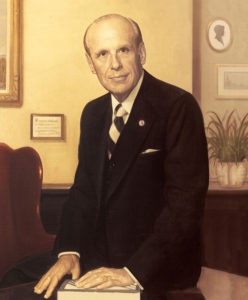James E. Wood Jr., a Baptist statesman and scholar recognized as one of the world’s leading authorities on the subject of church-state relations and religious liberty, died peacefully March 4 at age 96.
Born in Portsmouth, Virginia, Wood began his teaching career at Baylor University in 1955. He was named founding director of the J. M. Dawson Institute of Church-State Studies in 1957.

James Wood portrait in BJC offices in Washington.
He left Baylor in 1972 to become third executive director of what is today called the Baptist Joint Committee for Religious Liberty. He worked there eight years before returning to Baylor, where he resumed leadership of the Dawson Institute until 1995.
At the Baptist Joint Committee Wood succeeded C. Emanuel Carlson, who retired in 1971 after 17 years as executive director of the educational and advocacy group representing several Baptist groups in the United States. Joseph M. Dawson, former pastor of First Baptist Church in Waco, Texas, served as first executive director from the BJC’s founding in 1946 until his retirement in 1953.
Accepting the position at age 49, Wood set out to establish the BJC as a defender not only of various Baptist interests and institutions but as a champion of human rights in a free society.
“May no one fail to understand that our commitment is first to rights, not interests, and to persons, not to institutions, as applied to all men and not just a few,” Wood said in 1972.
In his inaugural address, Wood said the concept of religious liberty – a free church in a free state – demands a secular state, one that “is neither Christian, nor Buddhist, nor Muslim, nor religious nor irreligious.”
“To express it another way, the secular state seeks neither to promote nor to interfere with religion,” he said.
Toward the end of his time at the BJC, Wood warned against a tendency to conflate American nationalism and religion in the phrase “one nation under God.”
“It may well be that the most important problem confronting the church in our public life today lies in the widespread use of religion for political purposes,” Wood said in 1976. “God and religion are not national resources which our nation can possess or contain within our national life; nor is God some national resource we can harness or use to serve our ‘national interests.’”
Baylor professor Doug Weaver, current director of the J.M. Dawson Institute of Church-State Studies, said Wood put the academic study of church-state relations on the map.
“As a Baptist, Wood understood the importance of the separation of church and state and how that separation was good for both,” Weaver said. “As he noted that spread of authoritarian governments in his day, he strongly advocated for the religious liberty ‘as an axiomatic principle basic to all human rights.’”
Stan Hastey, former executive director of the Alliance of Baptists hired out of seminary by Wood as a news writer at the Baptist Joint Committee, said Wood’s emphasis on human rights began with “the historic Baptist conviction that the human spirit is innately sacred.”
“James Wood was indefatigable, working tirelessly on a wide range of public policy issues he considered the rightful agenda of the Baptist Joint Committee,” Hastey said. When some wanted to move BJC’s work to other agencies, Hastey said, Wood stood strong to “make the case that the Baptist voice advocating religious liberty in the nation’s capital should remain one voice.”
A graveside service is scheduled this afternoon at Olive Branch Cemetery in the City Park of Portsmouth, Virginia.
